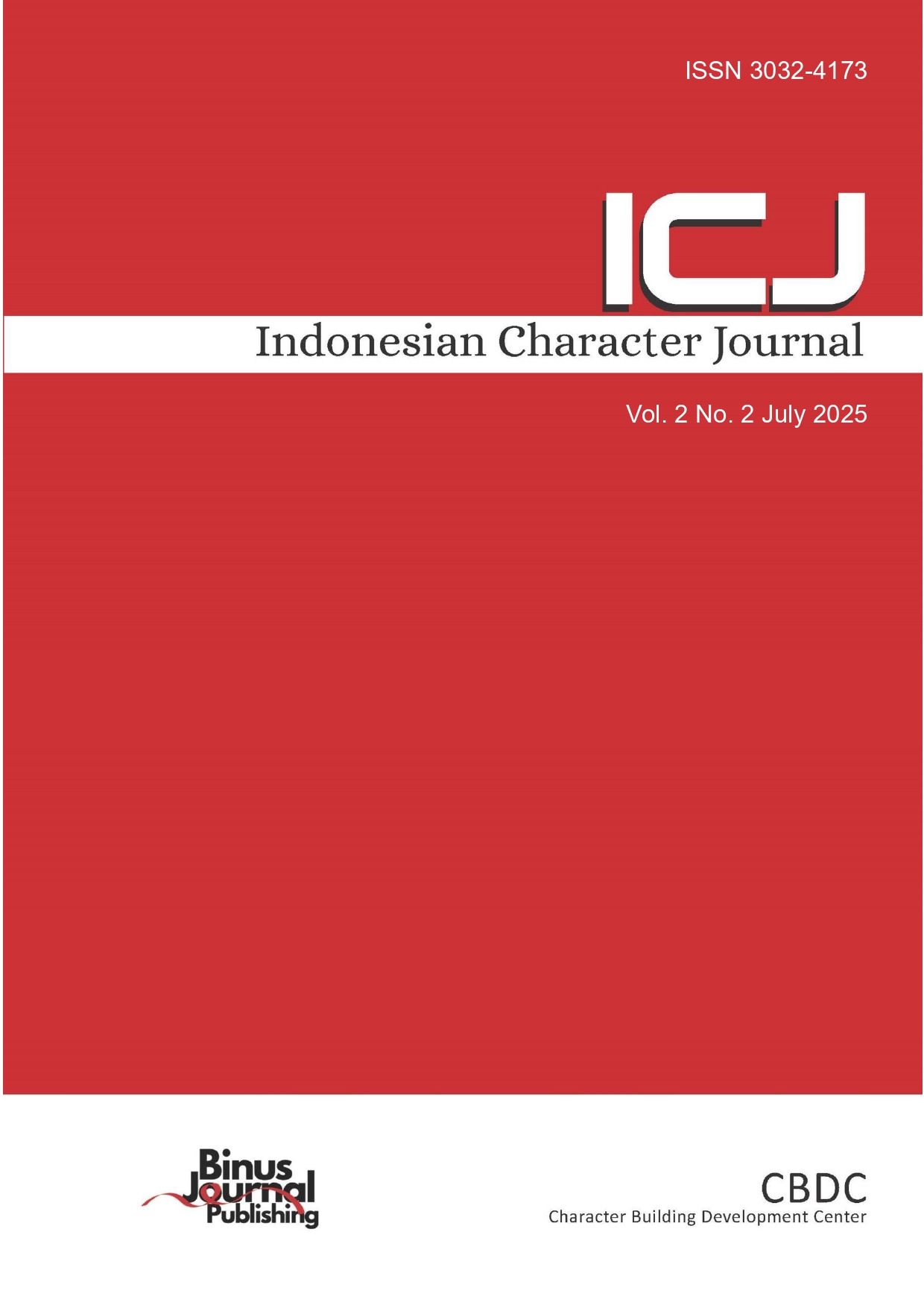Transmisi Budaya dan Konsep Konfusianisme dalam Kurikulum Pelajaran Agama Konghucu di Indonesia
DOI:
https://doi.org/10.21512/icj.v2i2.12134Keywords:
Konghucu religion, curriculum, the spread of Confucianism, localization, IndonesiaAbstract
This paper examines the spread and development of Confucian teachings in Indonesia that evolved into the Konghucu religion through the process of localization and institutionalization. Using a descriptive qualitative research method with inductive elaboration, the paper analyses the core concepts of the Konghucu religion’s educational curriculum in Indonesia, finding that the concepts of Godhead and the universe, the cultivation of morals and ethical norms, rituals and religious practices as well as the indigenization of Confucian teachings are the most prominent ones taught as Konghucu religious education. These elements demonstrate the unique position of Confucianism in Indonesian society and its important role in promoting social harmony, moral and ethical development, and cultural transmission, which ultimately has a positive impact on the education of national integration of the Republic of Indonesia.
References
Aprilia, S., & Murtiningsih, M. (2017). Eksistensi Agama Konghucu di Indonesia. Semantic Scholar. https://www.semanticscholar.org/paper/EKSISTENSI-AGAMA-KONGHUCU-DI-INDONESIA-Aprilia-Murtiningsih/bf49efcbc8ce5e 13f546099509ce27a06e70a0a9
Bayuarti,N.郑(zhèng)和(hé)在(zài)与(yǔ)印(yìn)尼(ní)的(de)遗(yí)产(chǎn)与(yǔ)影(yǐng)响(xiǎng). https://www.academia.edu/70802692/郑和在与印尼的遗产与影响
Budiarti, I., & Gunawan, A. (2021). Pendidikan Agama Konghucu dan Budi Pekerti untuk SMA/SMK kelas XI. Jakarta: Pusat Kurikulum dan Perbukuan.
Dewi, Shinta. (2005). Bon Bio, Benteng Terakhir Umat Konghucu. Surabaya: Penerbit JB Book.
Eko Putro M. Z. A. (2021). Confucian’s Revival and a Newly Established Confucian Institution in Purwokerto. Analisa Journal of Social Science and Religion, 6 (01), 63-77.
Gunadi, Kristan. (2021). Pendidikan Agama Konghucu dan Budi Pekerti untuk SMA/SMK kelas X. Jakarta: Pusat Kurikulum dan Perbukuan.
Halim S.S, & Truna D. (2023). Daoism and Confucianism in Indonesia. Idealogy Journal, 8(1), 41-51.
Hartopoh, D., & Epih. (2022). Pendidikan Agama Konghucu dan Budi Pekerti untuk SMA/SMK kelas XII. Jakarta: Pusat Kurikulum dan Perbukuan.
Kasyfurrahman T. N.Azhari A. G.Hekmatiyar E. S. (2020). Tapak Tilas Agama Konghucu di Indonesia dan Korelasi Ajaran Wu-Chang dalam Menjaga Integrasi Nasional. Jurnal Studi Lintas Agama, 15(01), 145-162.
Lasiyo. (2018). Pengaruh Buddhisme terhadap Neo-Konfusianisme di China. Jurnal Filsafat, 28(01),92-110.
MATAKIN. (2021). Sekilas Sejarah Matakin. https://www.matakin.or.id/category/berita/read/-sekilas-sejarah-matakin
Muhamad, N. (2024). Jumlah Penduduk Indonesia Berdasarkan Agama (Semester I 2024). https://databoks.katadata.co.id/demografi/statistik/66b45dd8e5dd0/mayoritas-penduduk-indonesia-beragama-islam-pada-semester-i-2024
Raco, J.R. (2018). Metode Penelitian Kualitatif Jenis Karakteristik dan Keunggulannya. Jakarta: Grasindo.
Rahmadani, R., Taufiq, T. T., & Djurban. (2022). Membaca Ulang Multikulturalisme Otonomis Agama Konghucu di Indonesia: (Identitas, Kultural dan Kesetaraan). Jurnal Studi Agama-Agama, 18(02), 13–28.
Sukmadinata, N.S. (2017). Metode Penelitian Pendidikan. Bandung: Remaja Rosadakarya.
Sulaiman. Agama Konghucu: Sejarah, Ajaran, dan Keorganisasiannya di Pontianak Kalimantan Barat. Jurnal Analisa, 2009, 16(01),50-63.
PP No. 55 Tahun 2007. (n.d.). Database Peraturan | JDIH BPK. https://peraturan.bpk.go.id/Details/4777
Oei, K.M (2018). yìn,印度(dù)尼(ní)西(xī)亚(yà)孔(kǒng)教(jiào)的(de)zhé,哲学(xué)思(sī)想(xiǎng)yán,研究(jiū)(Study on Confucian Religion’s Philosophy in Indonesia). Shandong: Shandong University Master Degree Thesis.
pú,蒲jùn,俊jié,杰, hú,胡qiàn,倩. (2021). rújiā,儒家文化(wénhuà)在(zài) “yí,一带(dài)一(yí)路(lù)”yánxiàn,沿线国家(guójiā)的(de)对外(duìwài)传播(chuánbō)研究(yánjiū)——yǐ,以越南(yuènán)、yìndùníxīyà,印度尼西亚、měnggǔ,蒙古为(wéi)例(lì)(Study on the Spread of Confucian Culture in the Countries Along the “Belt and Road” - Taking Vietnam, Indonesia, and Mongolia as Examples).jīn,今chuán,传méi,媒,29(04),4-6.
UU No. 5 Tahun 1969. (n.d.). Database Peraturan | JDIH BPK. https://peraturan.bpk.go.id/Details/49100/uu-no-5-tahun-1969
王(wáng)爱(ài)平(píng). (2010). yìn,印度(dù)尼(ní)西(xī)亚(yà)孔(kǒng)教(jiào)的(de)形(xíng)成(chéng)与(yǔ)发(fā)展(zhǎn)(Formation and development of Confucianism in Indonesia) .jì,暨南(nán)学(xué)报(bào)(zhé,哲学(xué)社(shè)会(huì)科(kē)学(xué)版(bǎn)),32(03):213-221.
王(wáng)慧(huì)敏(mǐn).(2017). yìn,印度(dù)尼(ní)西(xī)亚(yà)孔(kǒng)教(jiào)的(de)rú,儒家(jiā)文(wén)化(huà)教(jiào)育(yù)探(tàn)析(xī)(An Exploration of Confucian Cultural Education in Indonesian Confucianism ).国(guó)际(jì)rú,儒学(xué)发(fā)展(zhǎn)报(bào)告(gào). 山(shān)东(dōng)大(dà)学(xué)rú,儒学(xué)高(gāo)等(děng)yán,研究(jiu)院(yuàn), 2017:33.
Wibowo, A.M.(2014). Realitas Pendidikan Agama Konghucu Pada Tingkat SD di Kota Pekalongan Jawa Tengah. Jurnal Al-Qalam, 20(2), 211-220.
印(yìn)度(dù)尼(ní)西(xī)亚(yà)历(lì)史(shǐ). History Maps. https://history-maps.com/zh/story/ History-of-Indonesia
Downloads
Published
Issue
Section
License
Copyright (c) 2025 Siem Hong Hun

This work is licensed under a Creative Commons Attribution-ShareAlike 4.0 International License.
Authors who publish with this journal agree to the following terms:
a. Authors retain copyright and grant the journal right of first publication with the work simultaneously licensed under a Creative Commons Attribution License - Share Alike that allows others to share the work with an acknowledgment of the work's authorship and initial publication in this journal.
b. Authors are able to enter into separate, additional contractual arrangements for the non-exclusive distribution of the journal's published version of the work (e.g., post it to an institutional repository or publish it in a book), with an acknowledgment of its initial publication in this journal.
c. Authors are permitted and encouraged to post their work online (e.g., in institutional repositories or on their website) prior to and during the submission process, as it can lead to productive exchanges, as well as earlier and greater citation of published work.
Â
USER RIGHTS
 All articles published Open Access will be immediately and permanently free for everyone to read and download. We are continuously working with our author communities to select the best choice of license options, currently being defined for this journal as follows: Creative Commons Attribution-Share Alike (CC BY-SA)
Â








 This work is licensed under a
This work is licensed under a 